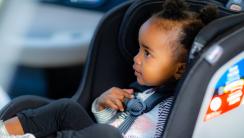Roberts Center for Pediatric Research 2716 South Street, 13th Floor Philadelphia, PA 19146
Breadcrumb
RESEARCH PORTFOLIO
Principal Investigator: Rachel Myers, PhD
The goal of this study is to create a unique source of epidemiologic crash data that enables novel description of use and installation patterns of child restraints among crash-involved children and— following linkage with hospital discharge and death certificate data—novel description of child occupant injury outcomes based on restraint use and installation (rear- vs. forward-facing).2025-2026
- Bringing the Latest Advances in Dynamic Temporal Analysis to Driving Safety: Predicting Young, Novice Drivers Who are at Risk of Crashing
Principal Investigator: Elizabeth Walshe, PhD
The CHOP-developed virtual driving assessment (VDA) can safely and reliably expose young drivers to common crash scenarios. This study seeks to mine the richness of the dynamic VDA data that may provide better prediction of crash risk by utilizing a new dynamic approach which transforms time-based data into meaningful intervals and makes patterns easier to analyze.
2023-2024
- Identifying Key Eye-Tracking Metrics Associated with Cognitive Control While Driving, Validated by MEG Neuroimaging: Phase III
Principal Investigator: Thomas Seacrist, MBE
Recent developments in eye-tracking and neuroimaging techniques are paving the way for novel approaches to understanding cognitive workload and cognitive errors during driving. Building on prior “MEG + Driving + Eye-Tracking” work, this study aims to (1) identify eye-tracking metrics that proxy increased cognitive control in a new cognitively challenging unanticipated steering task and (2) compare these eye-tracking metrics and frontal lobe…
- Identifying Key Eye-Tracking Metrics Associated with Cognitive Control While Driving, Validated by MEG Neuroimaging: Phase III
Principal Investigator: Elizabeth Walshe, PhD
Recent developments in eye-tracking and neuroimaging techniques are paving the way for novel approaches to understanding cognitive workload and cognitive errors during driving. Building on prior “MEG + Driving + Eye-Tracking” work, this study aims to (1) identify eye-tracking metrics that proxy increased cognitive control in a new cognitively challenging unanticipated steering task and (2) compare these eye-tracking metrics and frontal lobe…
2022-2023
- Individual Differences in Driving: Phase I
Principal Investigator: Elizabeth Walshe, PhD
This project aims to develop, test, and finalize all protocols and recruitment processes to be used in a future randomized control trial of modern driver training in the context of Graduated Driver Licensing.
2021-2022
- New Insights for the Auto Industry: Identifying Key Eye-Tracking Metrics Associated with Cognitive Control While Driving, Validated by MEG Neuroimaging
Principal Investigator: Elizabeth Walshe, PhD
This study aims to quantify eye behavior associated with increased cognitive brain responses during simulated driving scenarios in typically developed teens and conduct a pilot comparison of these eye tracking metrics and frontal lobe responses to those in teens with impaired cognitive control, via a diagnosis of autism spectrum disorder.
2020-2021
- Integrating Eye Tracking with Real-Time Neuroimaging and Simulated Driving: A New Paradigm for Auto Industry Testing
Principal Investigator: Elizabeth Walshe, PhD
This study aims to integrate eye tracking technology into the millisecond-sensitive neuroimaging methods (magnetoencephalography: MEG) and simulated driving paradigm, and test the feasibility and synchronization of the eye tracking, MEG imaging, and simulated driving data in a baseline sample of teen drivers.
2019-2020
- Bringing the Latest in Neuroimaging Technology to the Auto Industry: Developing a New Tool for Testing Man Machine Interfaces in Autonomous Driving
Principal Investigator: Elizabeth Walshe, PhD
This project aims to develop a new methodology for use by the auto industry in understanding driver traits and states in the context of Level 1-3 autonomous driving. An additional aim is to identify brain activity associated with simple and complex driving scenarios with and without warnings in young drivers.

